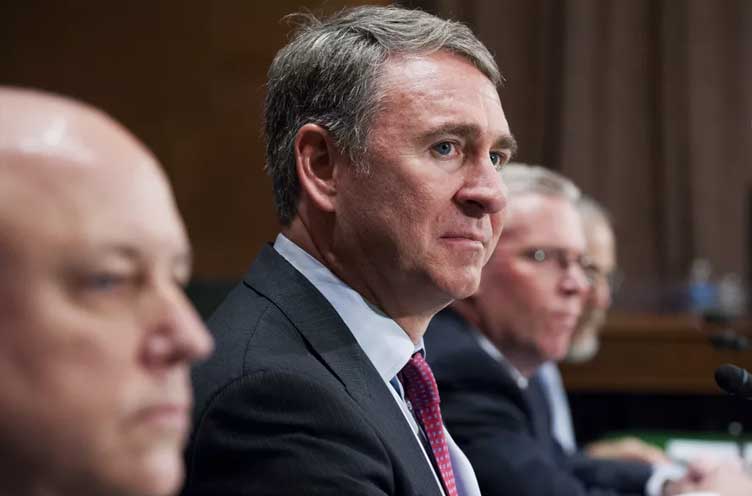Billionaire Executives At The Center Of The Gamestop Stock Trading Controversy Will Testify Before The House Financial Services Committee Today, Thursday, February 12th, Where They’ll Be Sitting Across From Lawmakers Whose Campaigns Benefitted From Their Big-Dollar Contributions.
Photo: Ken Griffin, CEO of Citadel, attends a Senate banking committee meeting in 2014.
Photo Credit: AP
Published February 18, 2021
The Center for Responsive Politics [By Karl Evers-Hillstrom] –
Lawmakers called for the hearing after a January clash between online investors and Wall Street forces rocked markets. Users of Reddit’s “r/WallStreetBets” orchestrated a short squeeze against hedge funds shorting GameStop, driving the video game retailer’s stock price to record levels.
However, the price of GameStop and other stocks targeted by Redditors plummeted when online brokers, namely Robinhood, blocked users from buying shares. The move prompted widespread outrage and caused small-time investors to lose big.
The spotlight later shifted to powerful hedge fund Citadel, which executes orders placed by Robinhood and other brokers. Citadel, which also provided billions to Melvin Capital after that firm suffered huge losses for heavily shorting GameStop, said it was not involved in brokers’ decision to halt trading.
The incident drew rare bipartisan backlash from Washington, pushing Robinhood to hire new lobbyists. Lawmakers on both sides of the aisle accused the financial services companies of manipulating the market.
“We must deal with the hedge funds whose unethical conduct directly led to the recent market volatility and we must examine the market in general and how it has been manipulated by hedge funds and their financial partners to benefit themselves while others pay the price,” Financial Services Committee Chairwoman Maxine Waters (D-Calif.) said in a statement in late January.
Executives at Robinhood and Citadel — who have made political donations to the committee’s members — will testify at Thursday’s hearing alongside Melvin Capital CEO Gabriel Plotkin, Reddit CEO Steve Huffman and Keith Gill, the Reddit trader credited with launching the GameStop movement.
Robinhood CEO Vlad Tenev made his first political donations in October 2020, when he gave $4,000 to political committees controlled by both Waters and ranking member Patrick McHenry (R-N.C.). Tenev said his company restricted trades because it did not have enough cash to meet regulatory requirements, and added he could have done a better job explaining the restrictions to customers.
Citadel CEO Kenneth Griffin is a far more prolific political donor. He’s given $124,300 to campaign accounts controlled by GOP members serving on the Financial Services Committee, including $26,300 to McHenry.
In the 2020 cycle, he gave the maximum $5,600 to several committee members, including Reps. Lee Zeldin (R-N.Y.), Bryan Steil (R-Wis.) and Ann Wagner (R-Mo.).
Griffin was the No. 5 biggest donor at the federal level in the 2020 cycle. He donated $61.4 million, just about all of which went to Republicans and conservative super PACs. He donated $37 million to the Senate Leadership Fund, allied with Mitch McConnell, and $10 million to House Republicans’ super PAC, the Congressional Leadership Fund.
Overall, the hedge fund industry has given nearly $2.7 million to the committee’s members, including roughly $967,000 in the 2020 cycle alone.
Democratic members received 57 percent of the campaign cash in the 2020 cycle. Rep. Josh Gottheimer (D-N.Y.) received nearly $156,000 from hedge fund employees and PACs, more than any other committee member.
The increased popularity of hedge funds over the last decade has translated to an uptick in donations. The industry gave $239 million in the 2016 cycle and $219 million in the 2020 cycle, up from around $65 million in 2012.
Like other deep-pocketed industries, hedge funds shifted toward Democrats during Donald Trump’s presidency. While hedge fund affiliates gave 51 percent of their donations to Republican candidates in 2016, they gave 73 percent of their donations to Democrats in 2020.
Wealthy executives often make political donations to members of Congress who sit on committees tasked with regulating their companies.
But that likely won’t stop lawmakers from making hedge funds the villain and publicly airing their grievances against Wall Street and Big Tech at today’s hearing.
McHenry, the committee’s ranking member, has expressed interest in changing rules to let retail investors access unregistered securities only wealthy investors can buy. Still, experts don’t expect serious legislation to emerge from the hearing, only plenty of headlines.





